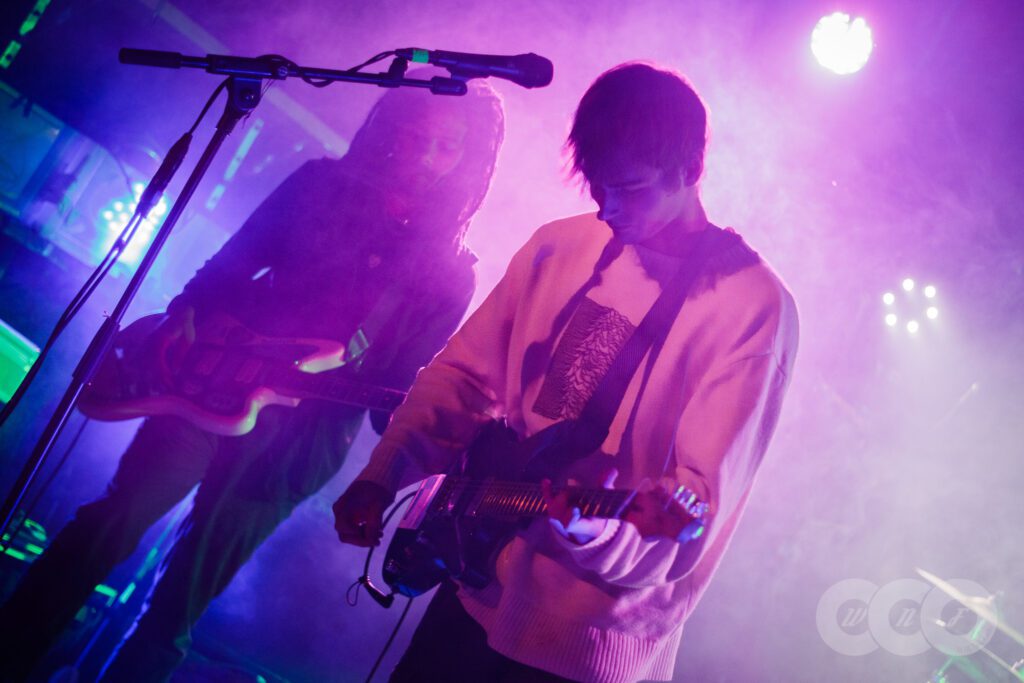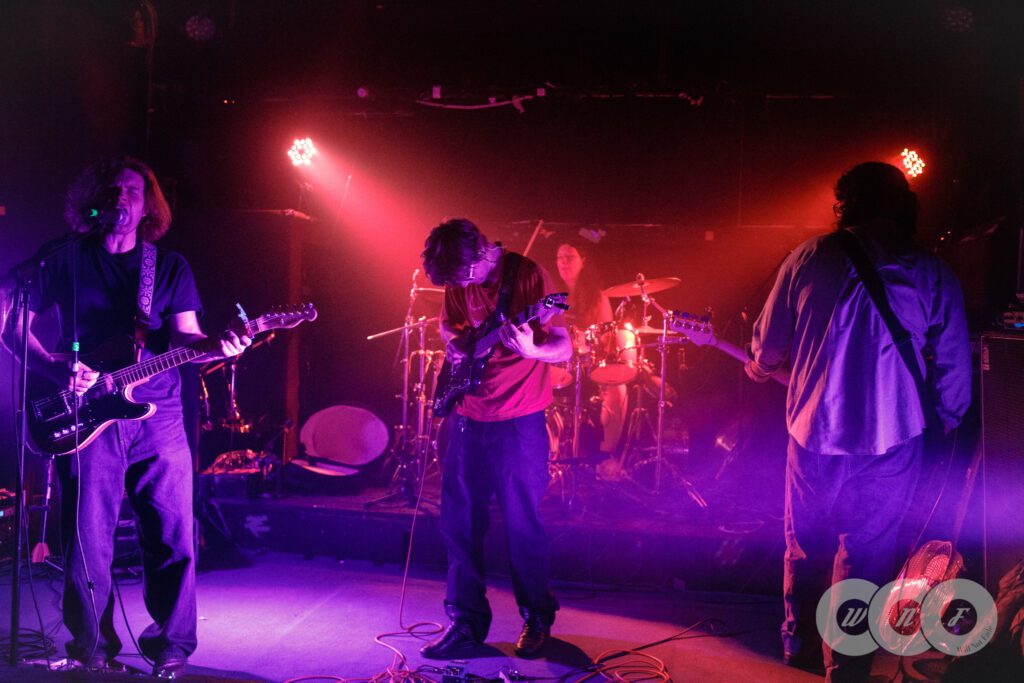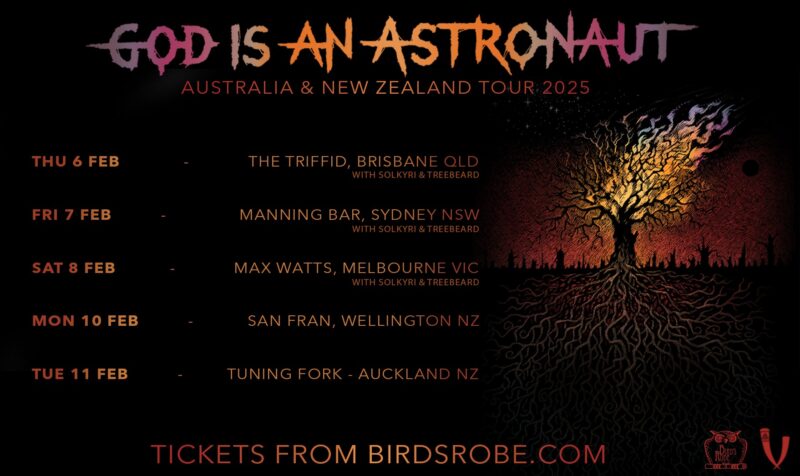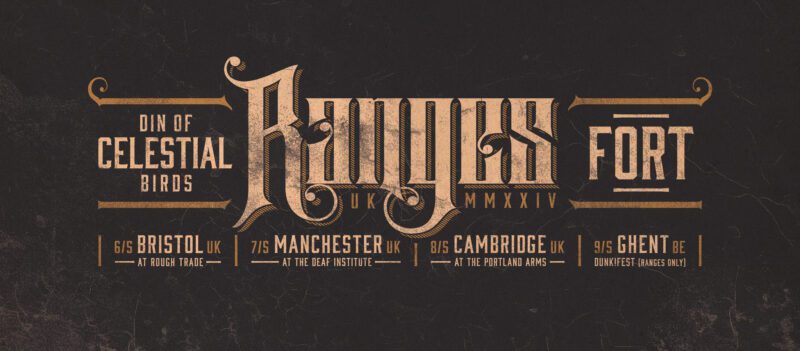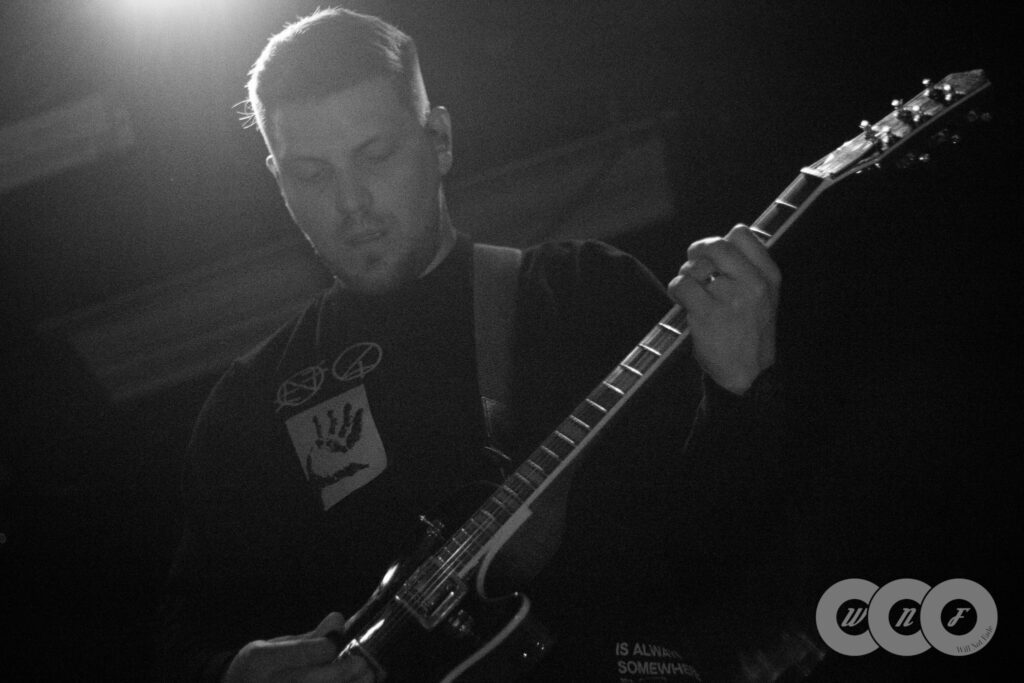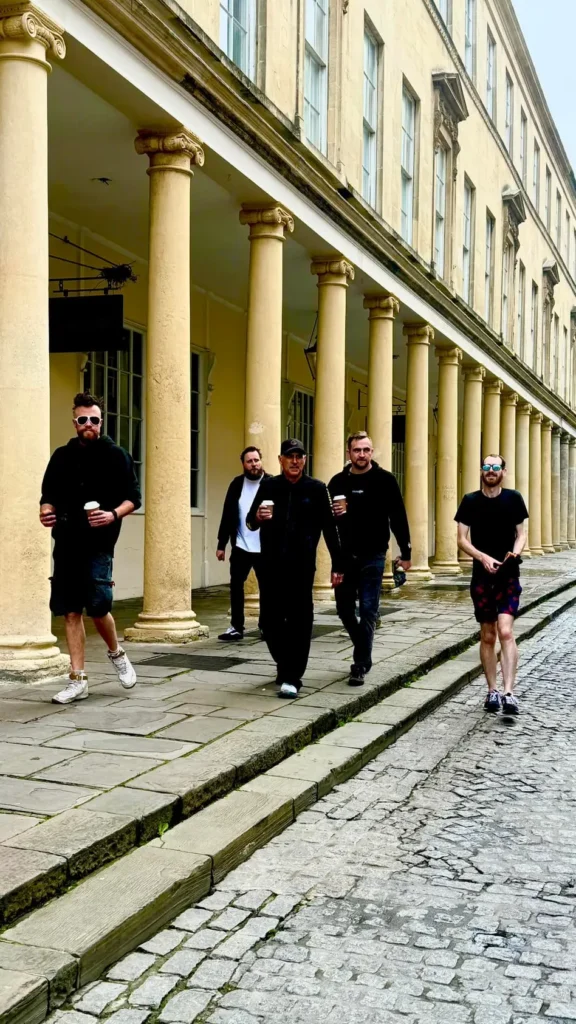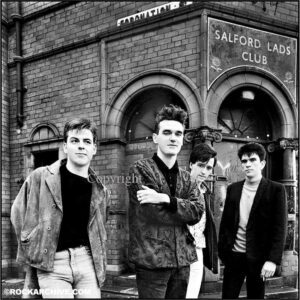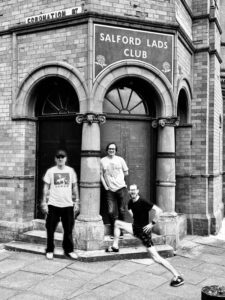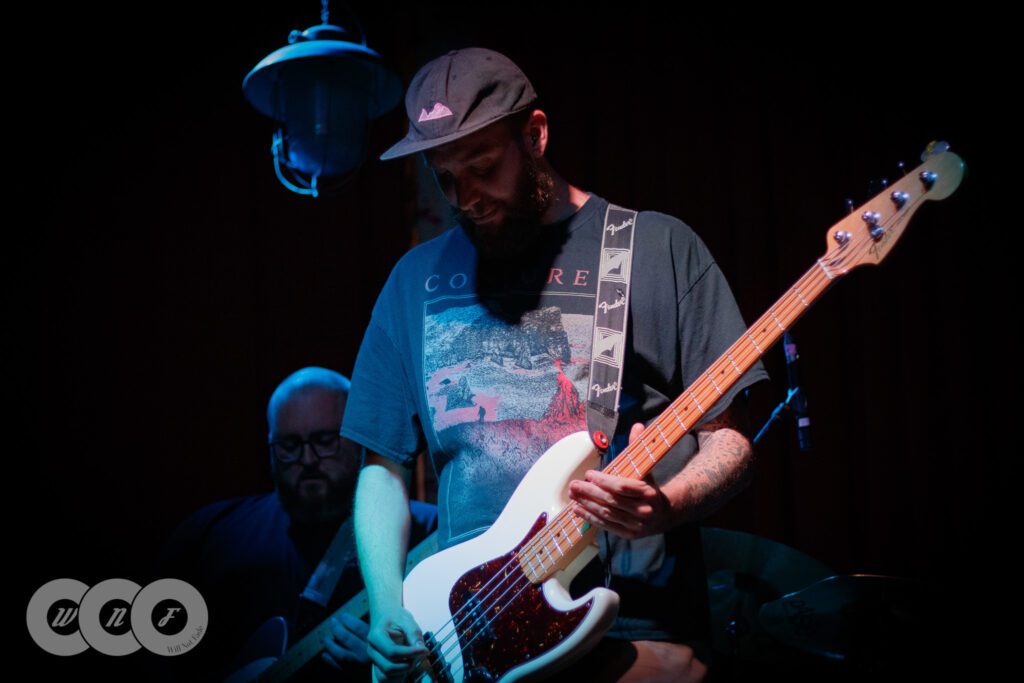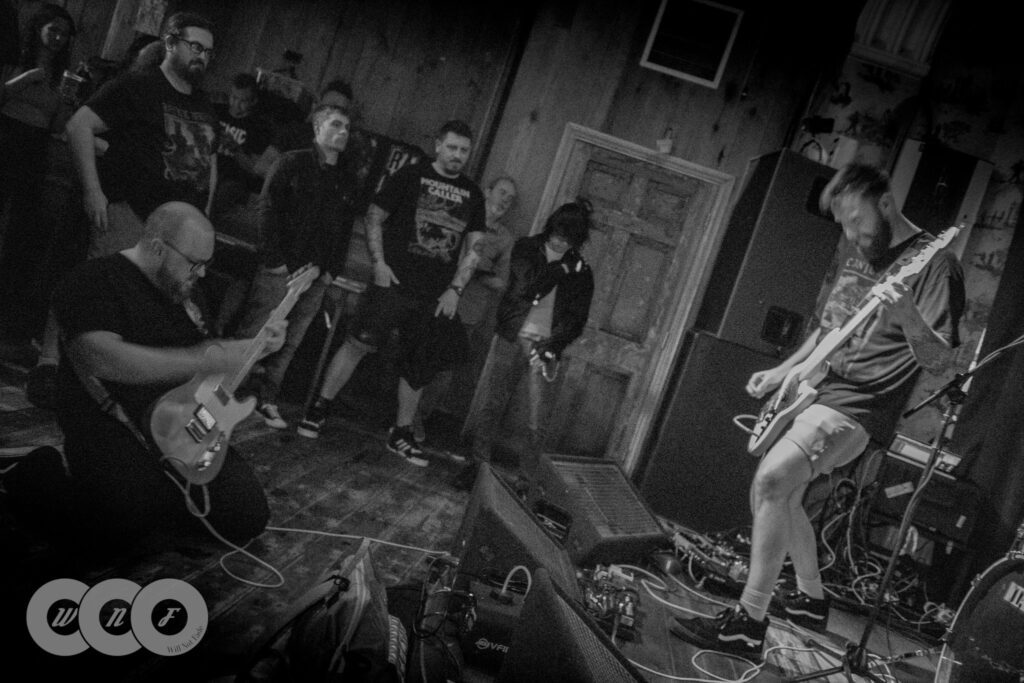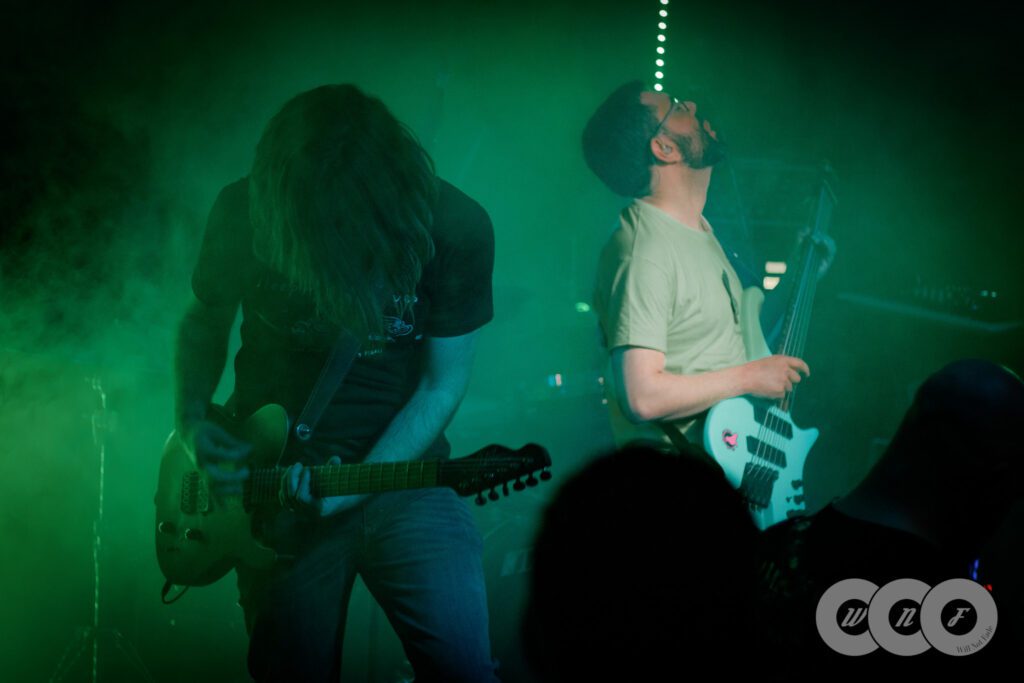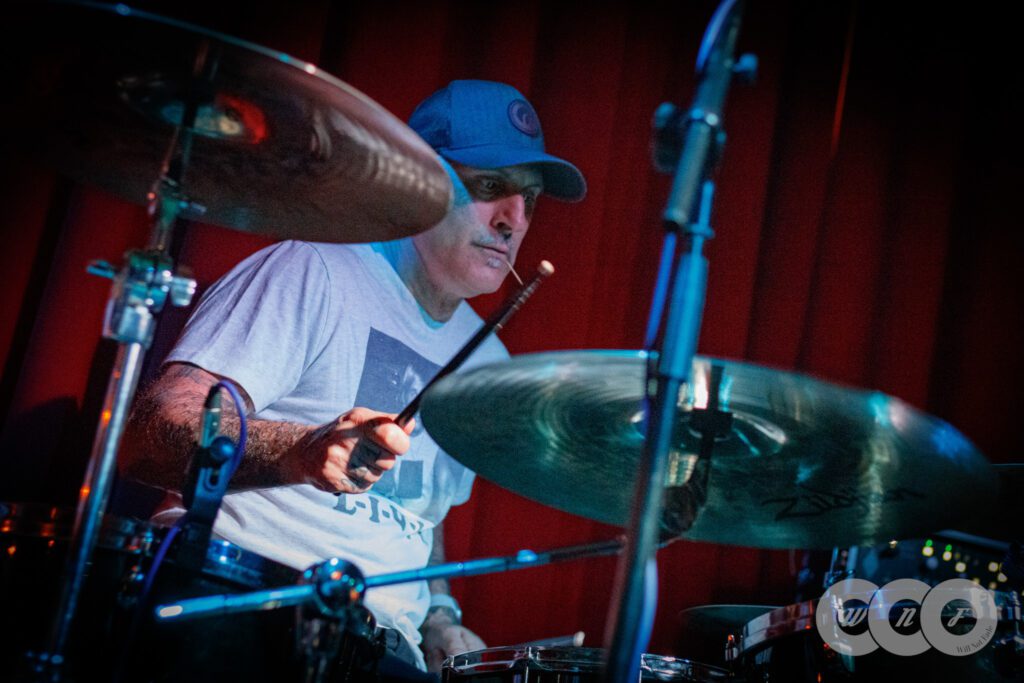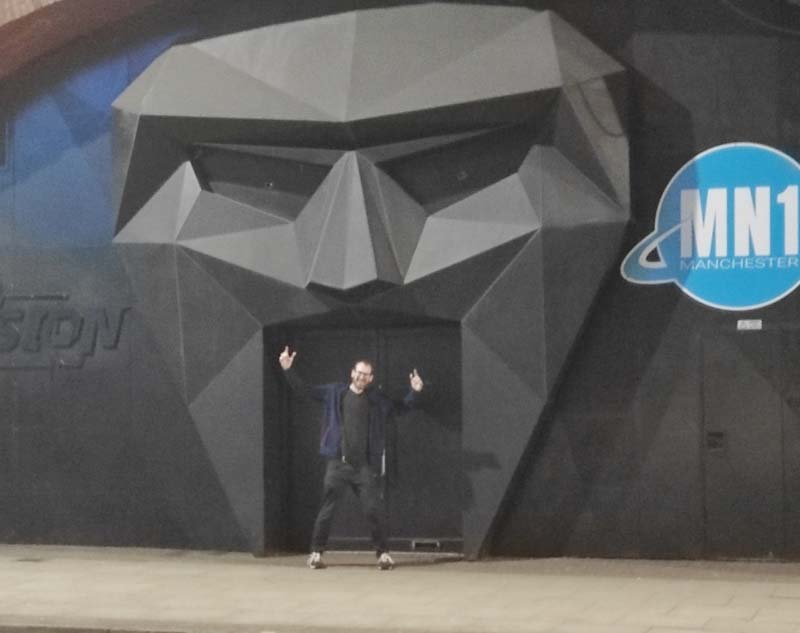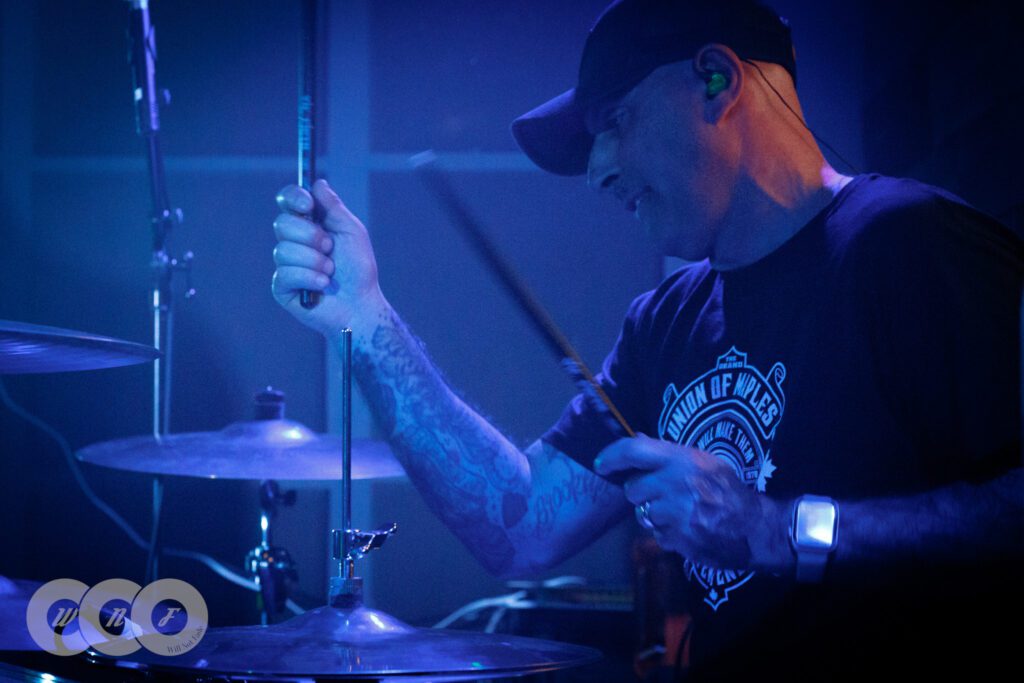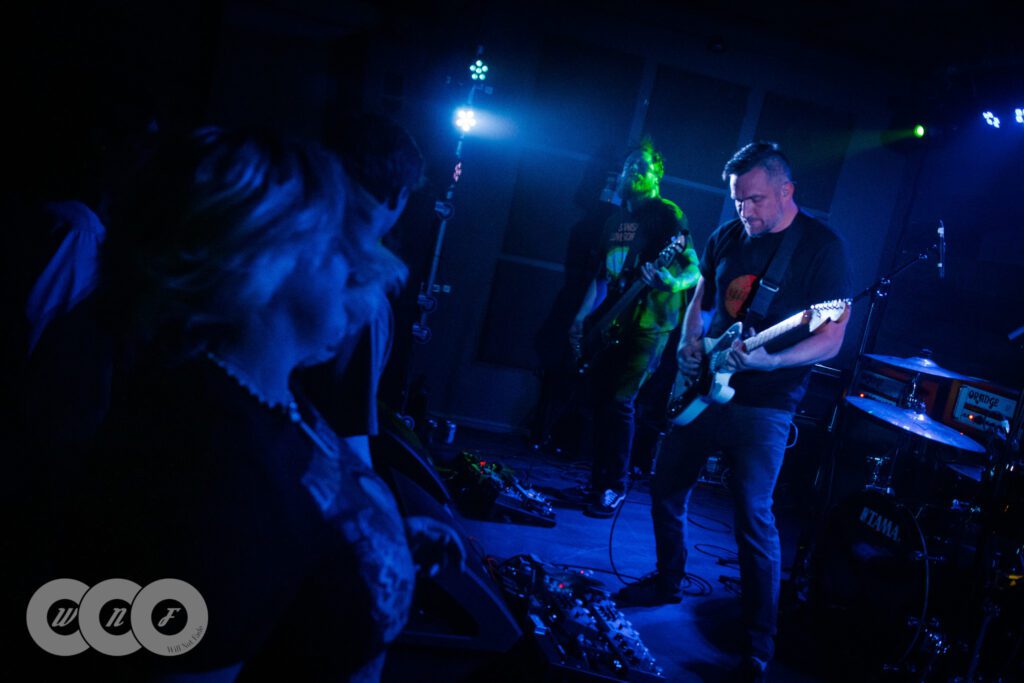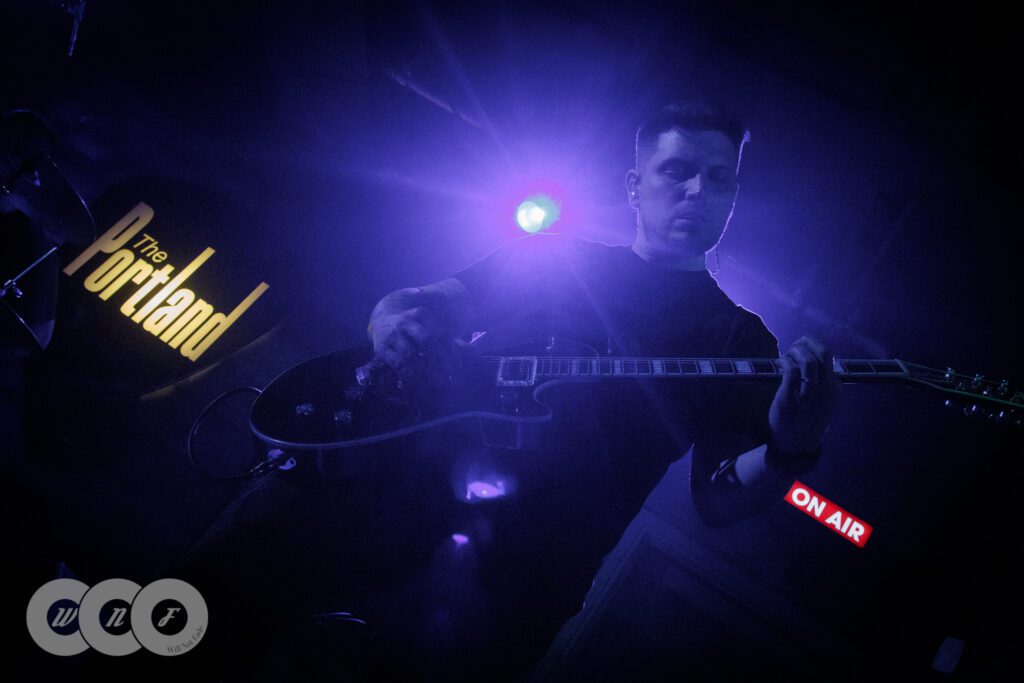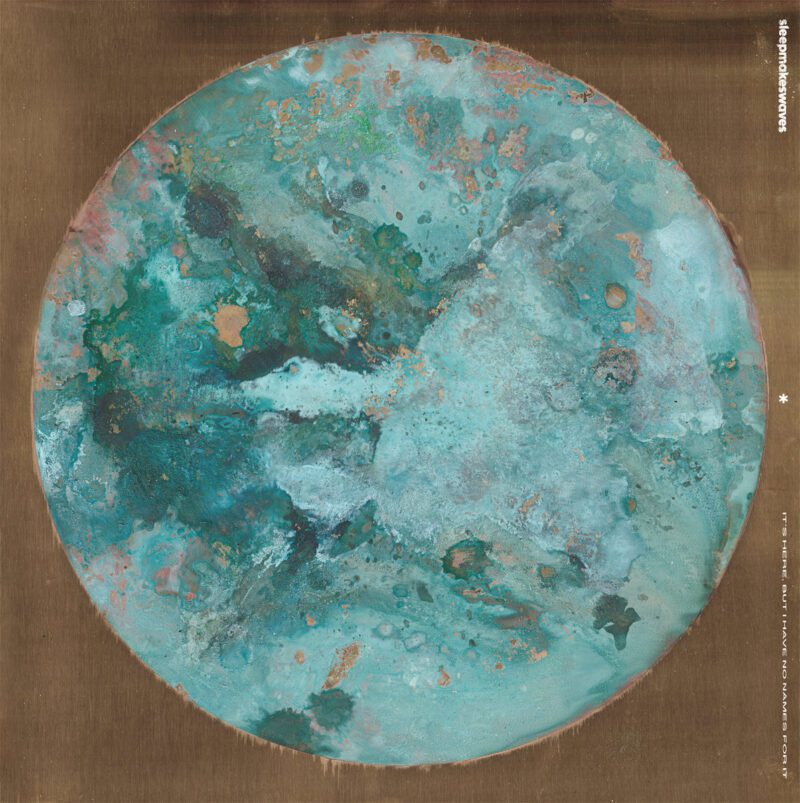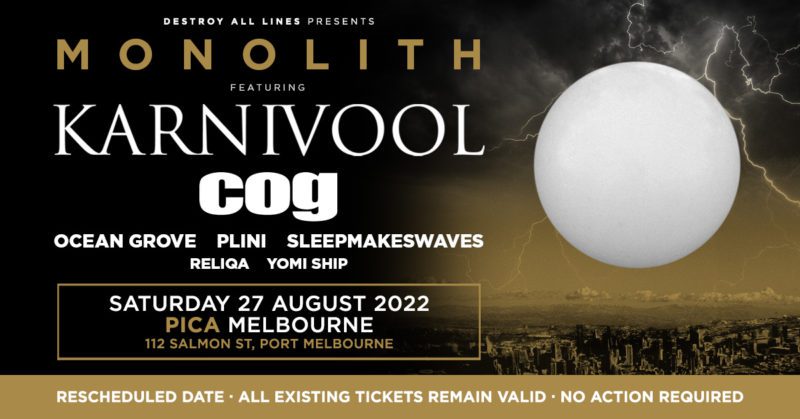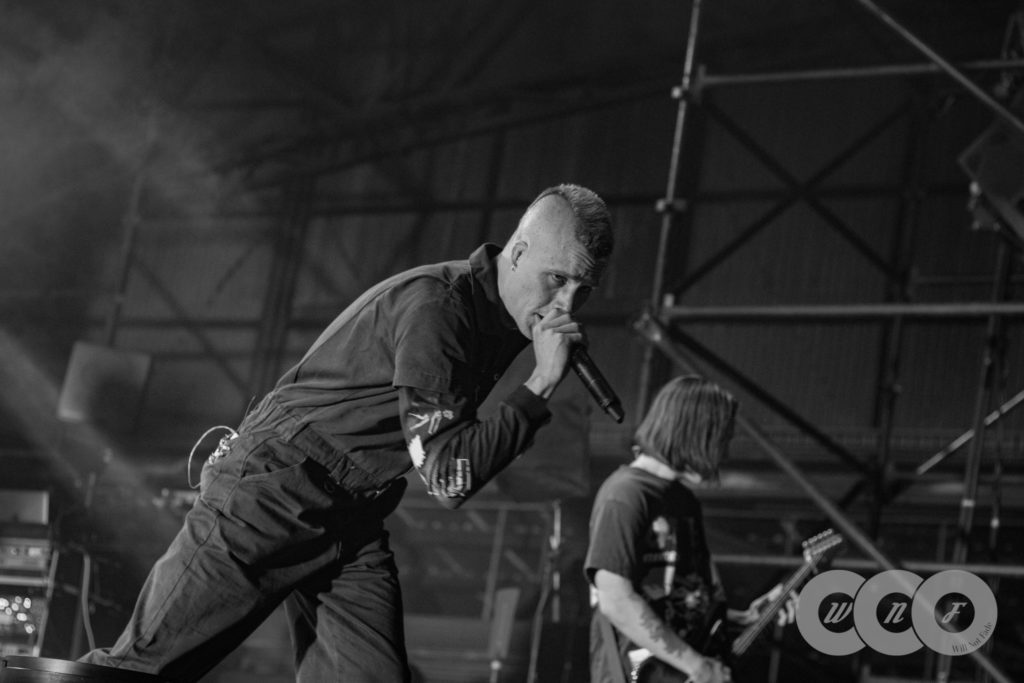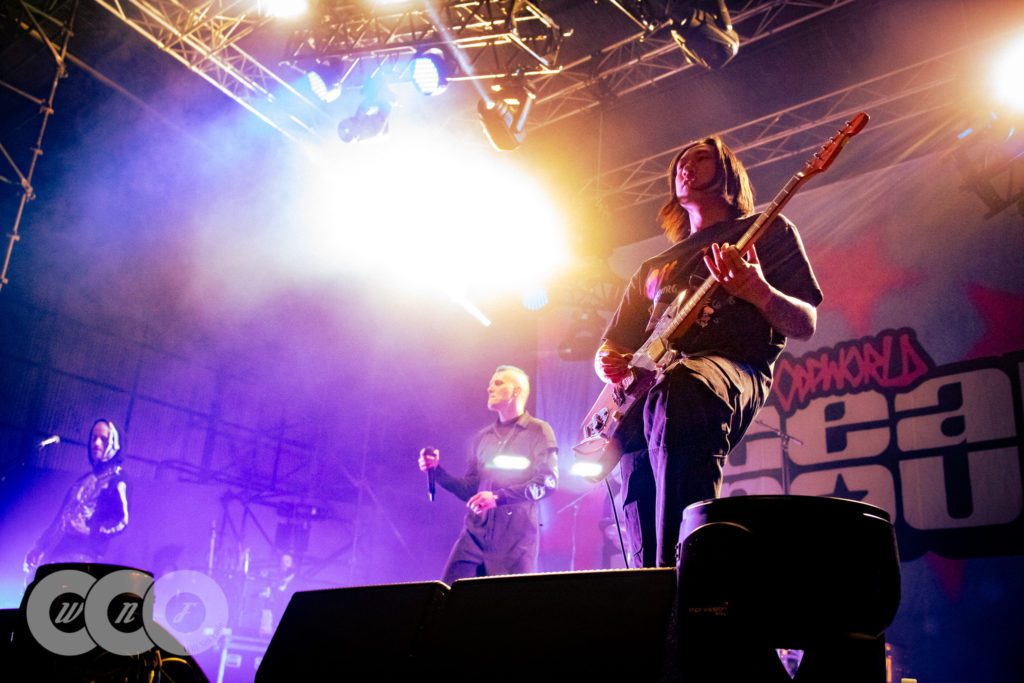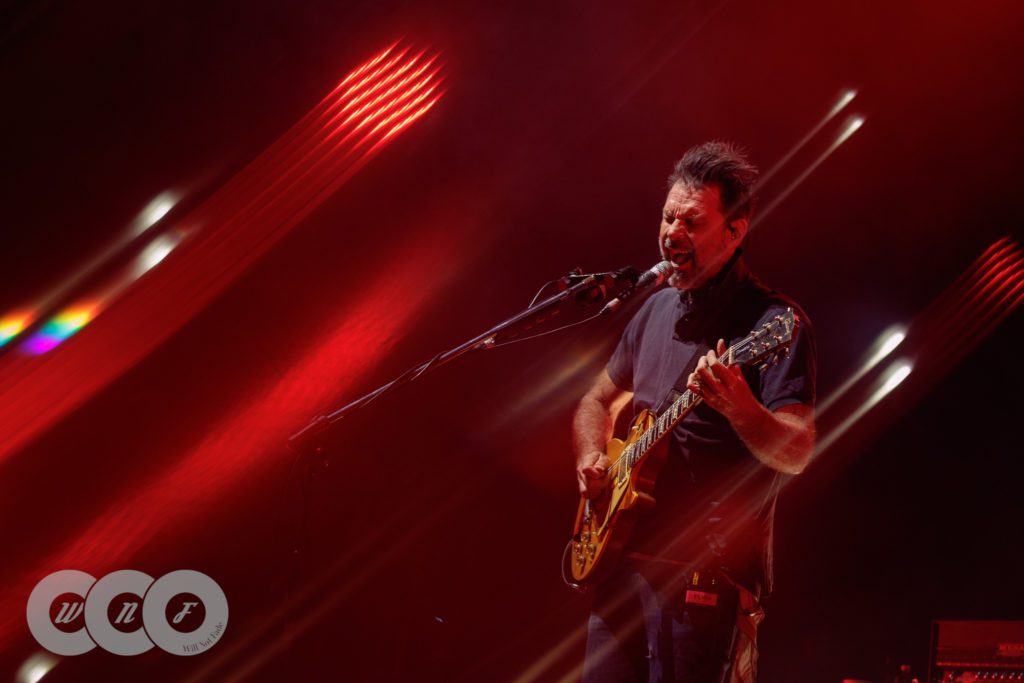Baggins is back with Ranges, baby!
It’s been aaaages. Last time I saw these guys was 2018. We’d planned on reuniting in 2020 but the pandemic cancelled those plans, and I was too cautious to try international travel when they next toured Europe in 2022. They’ve released three albums since I last saw them: Babel (2019), Cardinal Winds (2021) and 33 (2023), as well as re-releasing “Night & Day“, the release that first introduced me to Ranges. So I’m looking forward to seeing them play some fresh material.
A few updates since I last toured with Ranges: Jared the bass player moved to Ohio. And Joey on guitar moved to Idaho, where he is currently playing in a heavy band called Onsetter.
So Ranges are down to a core trio.
Wilson Raska contributes to the overall vision, concepts, and art. Seems a bit weird to include someone who doesn’t play the instruments, but anyone familiar with Ranges will know that their art and overall concepts are vital to who the band is. Wilson and CJ co-own A Thousand Arms – a record label, printing workshop and distro. Chances are high that if you’re a post-rock fan, you’ll have seen Wilson’s art on t-shirts or posters.
CJ Blessum is the band dad. The most driven person I know. He’s the guy up at all hours, coordinating with people, running merch stalls, driving all through the night to get to the next gig. On top of that, he writes some pretty damn good post-rock music. CJ used to contribute to Will Not Fade now and again, and invited me to tour with Ranges across America in 2017. That was one of the greatest things to ever happen to me.
And then we have Mark Levy. New York Hardcore drum legend. He’s a bit older than the others, and talks different, being from Brooklyn. And he is always the life of the party, and has a million amazing stories to share. He’s the guy I always turn to if I need drum advice.
Damn, I’ve really missed these guys. It’s amazing how spending time stuck in a van with a bunch of dudes for a few weeks can galvanise such friendships.
Last time I came to Europe I was in an absolute state for the entire tour. One of my flights – Auckland to Doha – was the longest commercial flight in the world at the time. Jetlag hit me hard and I felt too out of sorts to really enjoy myself. So this time I’ve opted to get to Europe a week earlier, hoping that the extra time would help me recover from jetlag before I join the band.
Also joining Ranges are Tim (guitar) and Tom (bass) from Astodan – an incredible Belgian post-rock band who Ranges first played with back in 2018. Tim is keeps up with Mark in terms of being larger than life and also being a drummer in a bunch of other bands in Belgium. He also finds it very hard to understand my New Zealand accent, which leads to lots of confusion and big laughs. Tom is a lot quieter, but he is by far the funniest person of the group when he cracks a joke.
We also have sound engineer Chuck Goodwin, who has also made the trip from Montana to keep the guys sounding great, and Sean Oliver is the Fanta-loving driver from Utah, charged with transporting us in the huge van.
Day 1
Monday 6 May 2024
Rough Trade Bristol, Bristol, England
w/ Fort, Din of Celestial Birds
I flew into London a week before meeting up with them, and arranged to meet them in Bristol on the day of the first show. They’d spent some time in Belgium rehearsing with Tim and Tom from Astodan. We were due to meet at Rough Trade, the venue, at 4pm for load in. But they’d encounters issues when trying to come across the channel on the train. They’d been sent back to Belgian to obtain signatures that disclose something to do with taxes before they were allowed across into the UK. This put them way behind schedule and they were pushing it to make it to Bristol in time for their set.
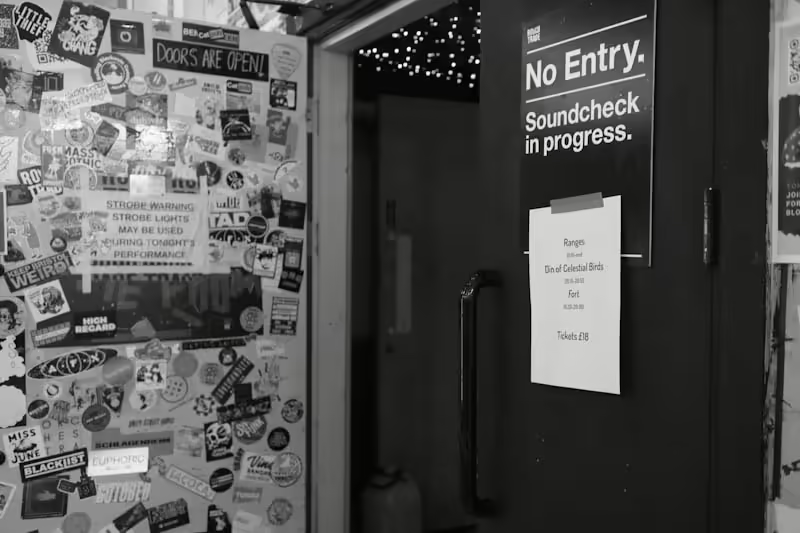

In the meantime I introduced myself to the other two bands, and helped Nick the sound tech set up. The house drum kit was a Natal – a brand I’d not encountered before. It was a really cool orange vistalite.
I’d seen El Ten Eleven play at a Rough Trade in Brooklyn, New York in 2017, so I’m assuming it is a chain of record stores. It was a nice venue. There were loads of cool records and books and posters for sale, as you’d expect. The venue was a great size and I got along great with Nick the sound tech. They had these interesting extractor fans that Nick told me they had been required to install before reopening after the covid pandemic. They suck fresh air into the room and filter viruses out, or something along those lines.
The first band to play, FORT, are Welsh. I’d been in communication with them leading up to this and I found them very friendly. They are high energy and the best part was during the final song when Gavin jumped down into the audience with his guitar and they all went nuts during the big climactic part.


Din of Celestial Birds are also playing dunk!fest at the end of the week, and have recently signed to A Thousand Arms. They give a more professional vibe, using backing tracks and even bringing their own fog machine and a lighting rig similar to the one Ranges had when I toured with them in the USA. There’s a lot more to take in, with six of them onstage.



We’d been nervous about when Ranges would arrive, given their big delay, but they arrived just in time. It was a rushed set up and line check, and then they played at their scheduled time. It was such a buzz to see the guys again after six years. It was mostly newer material that they’d written since I’d seen them last, but I got a bit emotional when they played a few Ascensionist songs. Tim and Tom were feeling a bit nervous about playing the set, being fill ins, but they did a stellar job and honestly, I don’t think anybody would have known that the band had only just arrived, or that they hadn’t played together much.



After the gig we drove to Bath and stayed at a YMCA. I bunked with Tim, Tom and Chuck.
Day 2
Tuesday 7 May 2024
The Deaf Institute, Manchester, England
w/ Fort, Din of Celestial Birds
Bath was named after ancient Roman public baths that were situated there, taking advantage of the natural hot springs. Like many English cities, there were grand, stately buildings everywhere with ornate masonry. I gave Sean a hat I’d bought for him at Primark that had the Fanta logo all over it. He was chuffed. Sean is a Fanta connoisseur, and loves trying the Fanta in every country he goes to because they’re all slightly different. French and Belgian Fanta are among his favourites, and American Fanta is sadly not up to par. We spent the morning soaking in the hot pools and steaming in the saunas. It was a great relaxing way to start the day.

L-R: Wilson, Tom, Mark, CJ, Me. Photo taken by Sean
Sean had stayed somewhere else, and had managed to maim his left hand when returning the key to the lock box. He showed up at the van at the agreed time, with a bunch of bloody napkins held to his palm. We stopped in at an emergency room on the way to Manchester, but there was going to be at least a three hour wait, so we got some dressings at the pharmacy and continued on our journey.
Mark was quite excited to go to Manchester because he’s a fan of The Smiths. He insisted on having a photos taken outside the Salford Lad’s Club, which I thought was the name of a brothel. He wanted to replicate a photo from God Save The Queen, by The Smiths. I don’t really know much about it, but please enjoy this photo that I edited of Mark, Sean and I at the Lad’s Club.


Tonight’s venue was The Deaf Institute. The facade read “ADULT DEAF & DUMB INSTITUTE”. Tom cracked a joke about there being a translator up the front to sign the lyrics, which was hilarious because all the bands are instrumental. There was another gig happening in the same building on the floor above.
Sean managed to get his hand seen to while we were setting up, which was a relief.
I liked the venue but the stage was tiny. Two members of Din of Celestial Birds had to stand on the floor in front of the stage because there was no way all six of them would fit. The lighting was also terrible. But the show was good and the band sold lots of merch.







Lots of people had mentioned that Manchester is great to visit. I had a little wander round during soundcheck but didn’t really see enough to form an opinion. I did find a place with a huge MF Doom mask though, which I loved.

After the gig we found a pizza joint that was still open after midnight, before heading back to the hotel we stayed at.
Day 3
Wednesday 8 May 2024
The Portland Arms, Cambridge, England
I would say this was the best day of the UK leg of the tour.
Wilson and I had matching shirts.

We stopped in at Croxden Abbey. I’ve been seeing lots of old churches and castles during my time in the UK, but I still get super excited about it every time. Many have been bombed during the WWII, or fell casualty to prior wars. Henry VIII also disbanded many churches, convents etc when he formed the Church of England so that he could divorce his wife. I love walking amongst the old ruins, admiring the workmanship that is still so evident hundreds of years later, and getting the sense of history of those locations. We did some cool/cheesy photoshoots before grabbing lunch.


Croxden Abbey
Lunch was at a quaint countryside tavern. We all ordered fish and chips. I didn’t think they were very good, but the others all loved the novelty of having such a distinctly English meal, complete with pints of ale, mushy peas, tartare sauce and lashings of malt vinegar.
I really liked The Portland Arms, our venue for the night. The stage lighting was on point, Chuck had the sound dialed in, and the green room was a welcome haven where we could relax, charge our devices, and use WiFi.
CJ took us on a walk around Cambridge. We climbed an old motte – the hill from a former castle where they would have built the defensive keep. We walked around some university grounds (around, not through. They were very clear that visitors are unwelcome), and saw a small apple tree that is theoretically linked to Isaac Newton somehow. The place reminded me of Oxford, although nowhere near as impressive. We finished up with some great doner kebabs from a street vendor before heading back to the gig.
I met a local photographer, Dobbin Thomas, who took some incredible shots of the night. He was happy for me to feature some here. Give him a follow: https://www.instagram.com/robin_dobbin_t
FORT by Dobbin Thomas


Din of Celestial Birds by Dobbin Thomas


Ranges by Dobbin Thomas


And here are some of my photos below






It looked and sounded fantastic. Ranges really came together tonight and locked in well. Everyone was on a high.
Day 4
Thursday 9 May 2024
En route to dunk!festival
We got up bright and early for a 7am departure. Touring can sound fun and glamourous, but the reality is often it means late nights, inadequate sleep, eating crappy food obtainable at petrol stations, spending all day in a van. Sometimes it wears you down. We spent hours at customs. The government wanted to ensure that we aren’t selling items that they could be claiming tax on. It just meant sitting parked up in a bay with hundreds of trucks and a lot of waiting.
This pushed back our departure time for our train to Europe. Which meant more waiting around. There were more confusions about the carnet at border security and the feeling in the van was starting to get tense, but Tim was able to talk things through with the police and it was fine. Thankfully he speaks French and was able to explain things. We finally got on the train to France and left just before 2pm.
We’ve got a long day of travelling ahead, but we’re excited to get to Belgium for dunk!festival. Din of Celestial Birds are scheduled for 17:40, and Ranges are on at 22:00
UPDATE WRITTEN LATER ON
We missed Din of Celestial Birds, but lots of people insisted that they were one of the better acts at dunk!fest that weekend so well done to them.
We made our way to Ghent, unloaded our gear, and then the Americans and I took our personal belongings to our accommodation. The accommodation was across the road from Kinky Star, the venue Ranges first played in Europe, back in 2018.
We made our way back to the venue. Last time I’d come to dunk!festival it was held at a magical space in Zottegem. There was a forest stage and a mainstage tent. People camped onsite and it had a wonderful culture where everyone reveled in the music, fueled by fries and the finest Belgian beers. They’ve switched venues, and now it is in Ghent. Regulars mourn the loss of the camping experience associated with the festival, and the stages didn’t have the same magical atmosphere as the forest, but it wasn’t a bad set up.
It was a pretty immense building, with four different stages as well as a bar/restaurant and artist green rooms. I was constantly getting lost as I tried to navigate the numerous staircases, but always found my way eventually.
We met back up with Tim and Tom. Their better halves had come to meet them. Tim’s wife is from Spain so I tried conversing with her in Spanish. Ironically enough, everyone understood me a lot more clearly when I spoke broken Spanish than when I just spoke in English with my New Zealand accent…
We visited catering, had a fantastic meal, and then began to set up our gear.
Chuck was getting a bit nervous, but he had the sound dialed. And people were already flooding into the room to listen to the soundcheck.
The Balzaal was full long before the band came onstage. I found this interesting. They could have chosen to watch other bands play downstairs. But they were that eager to see Ranges that they came early.




And that eagerness was justified.
I’ve seen Ranges play 22 times now. And this was the best by far. Tim and Tom bring an extra energy to the band that has elevated Ranges to new heights. They do jumps and kicks and move about, feeding off each other. I could see that they were all loving it, turning and looking at each other and just savouring the experience throughout their set. Being a drummer, I notice Mark’s playing the most, and I could tell he was giving it more oomph than usual. The lights looked incredible. Chuck had them sounding great. And the packed out audience was so enraptured to take it all in.
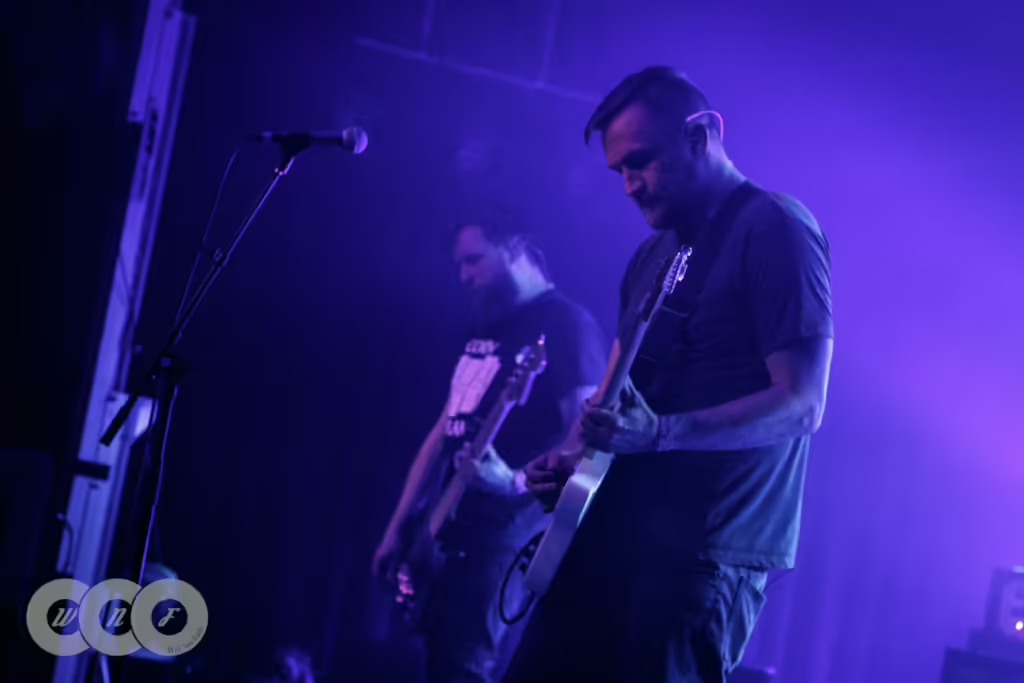
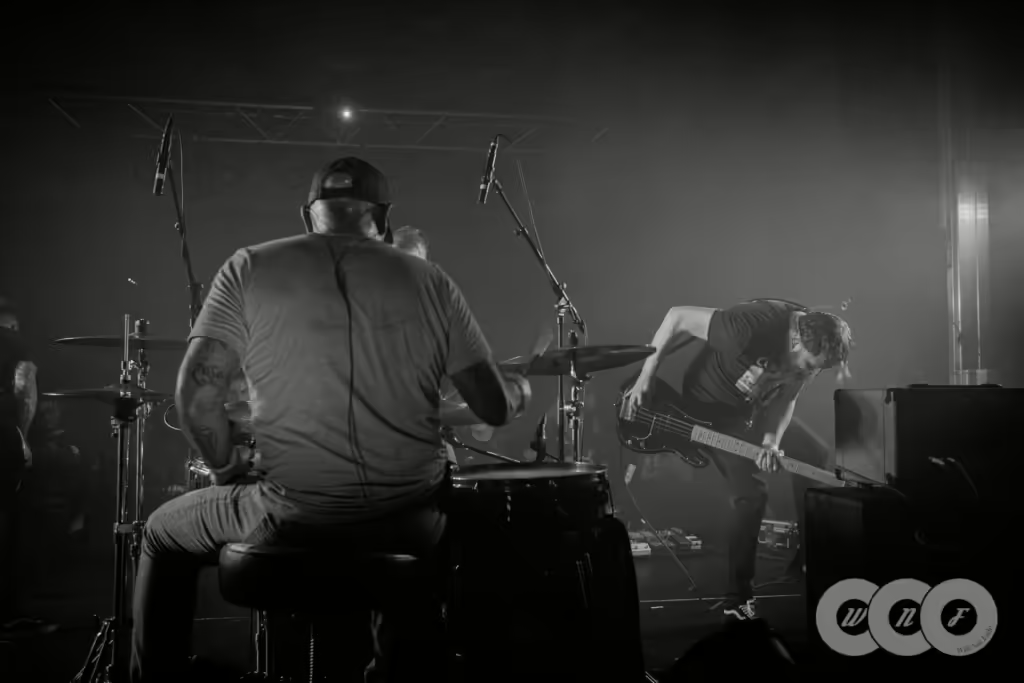


I took photos from backstage and ensured their drinks were topped up. I tried to get front of stage to take photos at one point but there were so many people that I didn’t want to push past. Tim was dripping with sweat and asked me to fetch him a towel. I looked all around backstage and eventually stole the handtowel from the toilet because I couldn’t find anything else.
Ranges set was a triumph. They were all just beaming. And rightly so.
At the end of the night we celebrated the end of the tour. Ranges had made a custom vodka to be released alongside their album Babel, and Wilson had specially bought a bottle and some cigars all the way from Montana. I don’t usually drink alcohol these days, but I joined in and got a bit silly. I’m sure Wilson has some embarrassing footage that will appear in a future Ranges release.
The rest of dunk!fest was cool. My highlights were Maserati and sleepmakeswaves. sleepmakeswaves was quite late on the final night and we were all tired and fading by that stage, but I’m glad I stuck it out because smw bring me so much joy. They faced a number of difficulties like pedals not working and straps breaking, but none of these hiccups dampened the mood.
It was nice to spend some quality downtime with the Ranges guys outside the festival as well, especially once the pressures of touring had finished. We enjoyed seeing some local sites (castles, canals and cathedrals!) and eating some great food like delectable French pastries, Belgian meatballs, and of course, frites. Last time I’d been in Ghent I was horrendously jetlagged and also got fairly drunk, so it was also nice to see more of the place in a less messy state.

With CJ and Mark in Ghent. Photo by Wilson Raska
CJ commented how dunk!festival always happens on Ascension weekend, Ascension Day being a public holiday. And that is the day that Ranges have played, on the three times they’ve played dunk!fest. And the first time, in 2018, they were touring their album The Ascensionist. There’s something especially fitting and special about that.
We had a teary goodbye at Brussels airport on the Sunday. These guys are like brothers to me. We’ve been through so much together. Over the years I’ve spent 4 weeks in the van with them, driving countless miles together. Drunken, late nights. Sampling local foods. Sharing beds in cramped sleeping quarters. Meeting crazy characters. So many laughs and stupid in jokes. Jokes that don’t make sense and we can’t even remember the origins of, but that we still find hilarious. Lots of bonding over incredible music.
I’m so thankful that CJ invited me to join them on tour back in 2017. And I’m thankful that he insisted that I join them on tour again this time.
Greets and great times to you all.
Joseph James AKA Baggins



